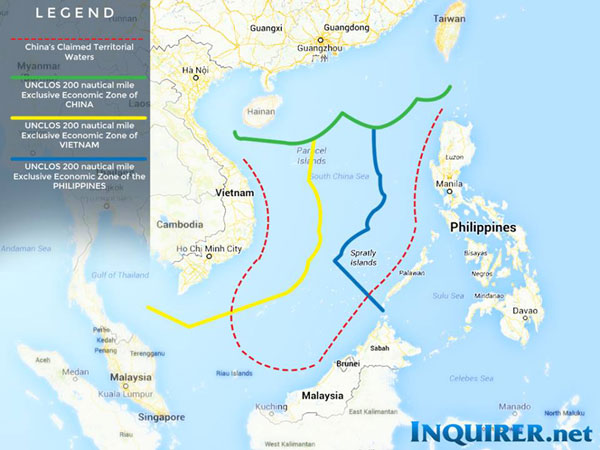
In a press conference on Friday, Chinese Foreign Ministry spokesperson Hong Lei described as “inconceivable and unreasonable” Aquino’s remarks in an interview with the New York Times earlier in the week.
“It is inconceivable and unreasonable to place the China-Philippines South China Sea disputes in the same category with the WWII history. The Chinese side is shocked at and dissatisfied (disappointed) with the remarks from the Philippine side,” Hong said at a press conference in Beijing Friday, a transcript of which the Chinese Embassy in Manila sent to local reporters on Saturday.
The official also made reference to China’s role in the “World Anti-Fascist War”— its resistance to Japanese aggression during World War II.
“As an unwavering upholder of international justice, China made huge sacrifice and indelible historical contribution to the victory of the World Anti-Fascist War,” Hong said.
The Philippines was also among the nations occupied by the Japanese during the war. But the two nations have since become close allies, this time facing parallel disputes with China: Manila in the West Philippine Sea, the name the government has given to that part of the South China Sea it claims to be within the Philippines exclusive economic zone, and Tokyo in the East China Sea.
Speaking to the New York Times on Tuesday, Aquino recalled how the Czech territory of Sudetenland was given to appease Hitler during Nazi Germany’s reign over western Czechoslovakia.
The President also warned that allowing China to occupy Philippine-claimed territories in the West Philippine Sea, such as the Scarborough Shoal off Zambales, might set a precedent for Beijing to expand its territory into other disputed areas.
Aquino’s statements came amid international concern over China’s recent unilateral actions in disputed regional waters: the implementation of a new fisheries law requiring foreign vessels to first seek permission before exploring the South China Sea in January, and the declaration of an Air Defense Identification Zone in the East China Sea in November.
Apart from the Philippines, Vietnam, Malaysia, Brunei and Taiwan have claims to islands in the South China Sea that China claims fall within its territory.
Citing international law, Manila has asked for arbitration of its dispute with China under the United Nations system, but China has refused the arbitration procedure.
“The fact is crystal clear. Our two countries also have disputes over the delineation of maritime boundaries. China firmly opposes the Philippines’ occupation of China’s islands and reefs. The Chinese government has firm resolve to uphold territorial sovereignty and maritime rights and interests,” said Hong.
He reiterated China’s call for direct negotiations among claimant nations, an approach contrary to the Philippines’ stand that the dispute should be resolved through multilateral talks.
“We also commit to the settlement of relevant disputes through direct negotiation and consultation among relevant parties concerned. We hope that the Philippines will correct its mistakes and work toward the same goal with China to jointly uphold regional peace and stability,” said Hong.